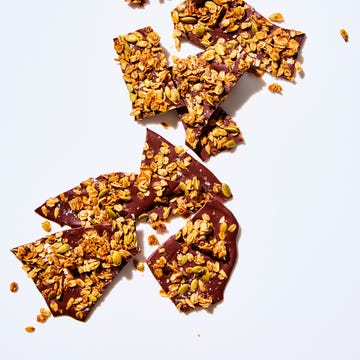 Media Platforms Design Team
Media Platforms Design TeamChronic inflammation can throw off your hunger mechanism and metabolism-regulating hormones, spur insulin resistance, and even cause you to hang onto water weight, says nutritionist Alex Caspero, R.D. What's more, research published in the journal Diabetes has linked elevated levels of inflammatory markers with future weight gain. While pretty much any good-for-you food will lower your body's levels of inflammation at least a bit, these eight foods truly go above and beyond.
Salmon
 Media Platforms Design Team
Media Platforms Design TeamFat makes up your body’s inflammation-regulating compounds, called prostaglandins. And while some reduce inflammation, others egg it on. To up your levels of inflammation-fighting prostaglandins, eat more omega-3 fatty acids like EPA and DHA—for which salmon and other fatty fish are famous, says Caspero. What’s more, since omega-3's can help decrease your levels of inflammation-causing LDL "bad" cholesterol and triglycerides, they can lower inflammation even more, says Rene Ficek, R.D., lead nutrition expert at Seattle Sutton's Healthy Eating.
Advertisement - Continue Reading Below
Flaxseeds
 Media Platforms Design Team
Media Platforms Design TeamBlueberries
 Media Platforms Design Team
Media Platforms Design TeamAdvertisement - Continue Reading Below
Curry
 Media Platforms Design Team
Media Platforms Design TeamTurmeric gives curry its yellow color, along with a hefty load of bioflavonoids, says Caspero. Plus, research from the University of Texas shows that turmeric suppress NF-kappa B, an immune-regulating protein that triggers inflammation.
Tart Cherries
 Media Platforms Design Team
Media Platforms Design TeamHailed as having the "highest anti-inflammatory content of any food" by Oregon Health and Science University researchers, tart cherries are filled with anthocyanins, antioxidants that are known to reduce inflammation as effectively as some pain meds.
MORE: The Amazingly Easy Way to Pit Cherries That Will Save You Hours
Advertisement - Continue Reading Below
Edamame
 Media Platforms Design Team
Media Platforms Design TeamThis one hits inflammation from a couple angles since it's rich in isoflavones and omega-3 fatty acids. The result: lower levels of C-reactive protein, a marker of inflammation, says Caspero.
Green Tea
 Media Platforms Design Team
Media Platforms Design TeamAdvertisement - Continue Reading Below
Whole Grains
 Media Platforms Design Team
Media Platforms Design TeamIn one study published in The American Journal of Clinical Nutrition, people who ate whole grains (think: oatmeal, brown rice, and barley) lowered their levels of C-reactive protein by 38 percent compared to those who opted for refined grains. And that was after controlling for the weight they lost!
MORE: 4 Gluten-Free Ways to Get the Nutritional Benefits of Whole Grains
Advertisement - Continue Reading Below
Advertisement - Continue Reading Below
Advertisement - Continue Reading Below













